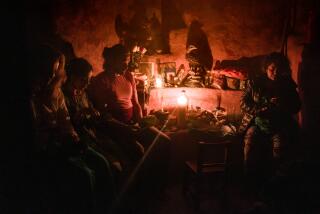Judge Orders Confiscated Peyote Given to Minister
- Share via
A Municipal Court judge Tuesday ordered authorities to release 250 pounds of peyote to a Native American Church minister, bringing an end to the bitter fight over the hallucinogenic cactus seized from an ex-bank robber and his friend last month.
Judge Steven Hintz told the Ventura County Sheriff’s Department to release the peyote to minister Kenneth Littlefish Durant at noon today so he can take it back to his tribe in Washington state for use in religious ceremonies.
“I am satisfied with the evidence that Kenneth Durant meets all the qualifications of a person who is authorized to purchase peyote for religious purposes,” he said.
“I do not believe they were contraband,” Hintz said of the 10,000 blue-green peyote buds, known as buttons, that were seized by authorities.
The judge’s ruling was met with loud applause and cheers by about 30 Native American supporters who have protested prosecutors’ unwillingness to release the peyote.
Prosecutors requested a stay for 48 hours to give the district attorney’s office time to respond to Hintz’s ruling, indicating that they may file an appeal to block the return of the peyote.
Hintz gave prosecutors until noon today to make their challenge.
“We haven’t made the decision yet,” Deputy Dist. Atty. William Redman said Tuesday night. “The question remains as to whether the judge exceeded his authority.”
Although Redman said he is not opposed to releasing the peyote to the church, he said a legal problem may exist because the religious group was not a party to the legal request to return the substance.
“We have no objection to that,” Redman said, referring to giving the peyote to the church. “The whole issue has been these two people.”
The cactus was confiscated last month, when sheriff’s deputies arrested Durant’s brother, Paul Skyhorse Durant, and his friend Buzz Joseph Berry, for possession and for Paul Durant having an outstanding arrest warrant.
Last week, prosecutors decided not to file drug charges against the two men but they have continued to investigate what the men were doing with the peyote and whether it was obtained lawfully.
During Tuesday’s proceedings, Redman suggested that Durant and Berry used fraudulent papers in purchasing the peyote in Texas and therefore had no legal right to have it returned. The hearing was on the men’s motion to get the peyote back.
But Hintz dismissed that argument as an issue better left to Texas authorities and ruled that the peyote should go to its intended recipient--the Native American Church of the Squohomish tribe in Washington state.
Kenneth Durant told Hintz during the hearing that he sent his brother to Texas to pick up the peyote on behalf of the church.
The legal maneuvering during the past two weeks has frustrated supporters who have prayed, beat Native American drums and burned sage outside the courthouse in an ongoing vigil to get the peyote back.
But outside the courtroom Tuesday evening, supporters of the Durants and Berry cheered, chanted and praised the judge’s decision. But some were cautious about celebrating too early in the event that the district attorney decides to press the issue in a higher court.
“I feel like I have been on a roller coaster,” said Ventura resident Ana Becerra. “It’s just kind of playing with everyone’s minds.”
Although legally a controlled substance, peyote is revered by some Native Americans as the “flesh of God” and its use and possession are protected under federal law if intended for religious purposes.
But prosecutors say Paul Durant and Buzz Berry may have improperly obtained their 250 pounds of peyote from a Texas dealer. And given Durant’s past run-ins with the law, prosecutors said they are suspicious.
In 1978, Durant was acquitted of murder after a celebrated, yearlong trial in Ventura County. He and Richard Mohawk were accused of slaying taxicab driver George Aird, whose mutilated body was found near an American Indian Movement camp in Box Canyon near Simi Valley in 1974.
In 1984, Durant and Mohawk were convicted of a violent bank robbery in a Los Angeles federal court. Durant was sentenced to eight years in prison while his partner received 20 years.
Last month, Durant and Berry were arrested in Oak View for possession of peyote and on an outstanding traffic warrant after being stopped by a sheriff’s deputy on a traffic violation.
As their drug possession case played out over the past two weeks, a public defender argued that under federal law they have the constitutional right as Native American Church members to use and transport peyote for religious ceremonies.
But prosecutors said this case is not about constitutional rights or religious freedom. The issue, they said, is whether Durant lawfully acquired the peyote.
“It has nothing to do with whether the Native American has the right to peyote,” Redman said in court. “The issue is whether this specific individual--Mr. Durant--lawfully acquired the peyote.” If he did not, Redman said, “he is not entitled to have it back.”
During the hearing, Sheriff’s Det. Tim Waite testified that he contacted officials with the Native American Church and the Texas Department of Public Safety--none of whom said they knew, heard of or authorized Durant or Berry to transport peyote.
But Deputy Public Defender Michael Schwartz said that even if an impropriety occurred, it is an issue that should be taken up by Texas officials, not Ventura County prosecutors.
Judge Hintz agreed. “If there was fraud, it was in Texas,” he said. “And if an authorized person distributing peyote failed to follow the rules for distributing peyote, it happened in Texas.”
More to Read
Sign up for Essential California
The most important California stories and recommendations in your inbox every morning.
You may occasionally receive promotional content from the Los Angeles Times.













